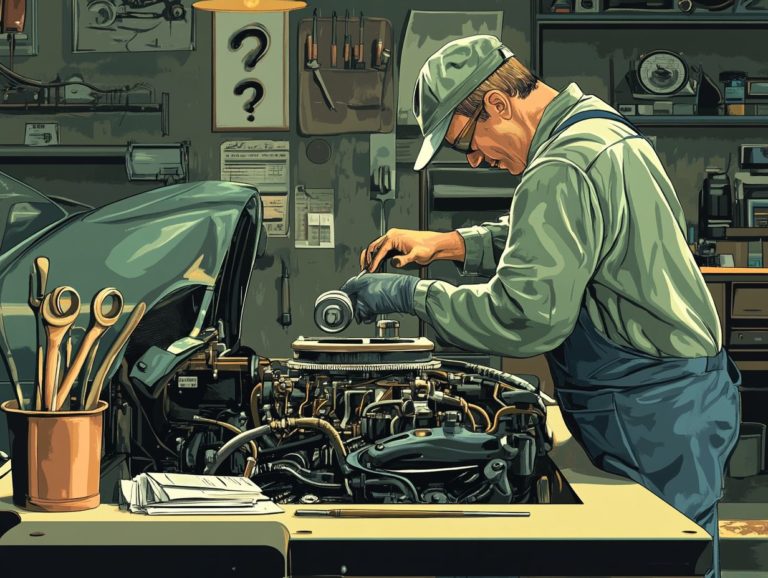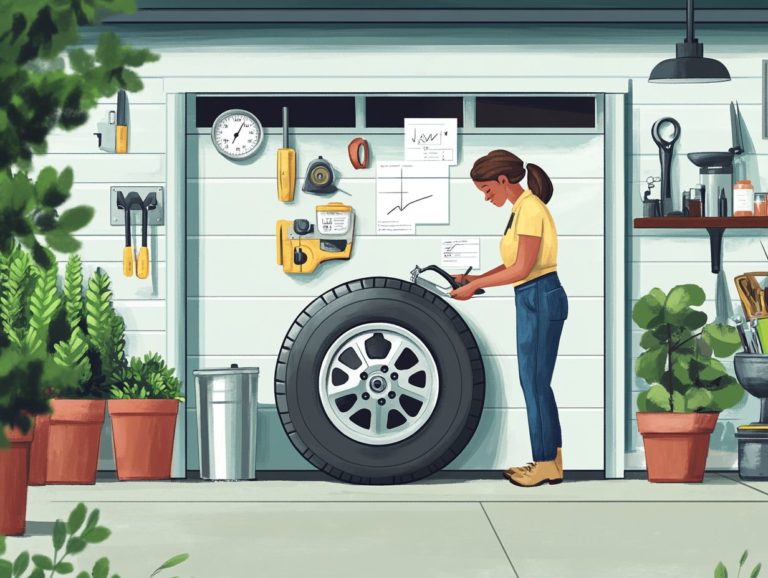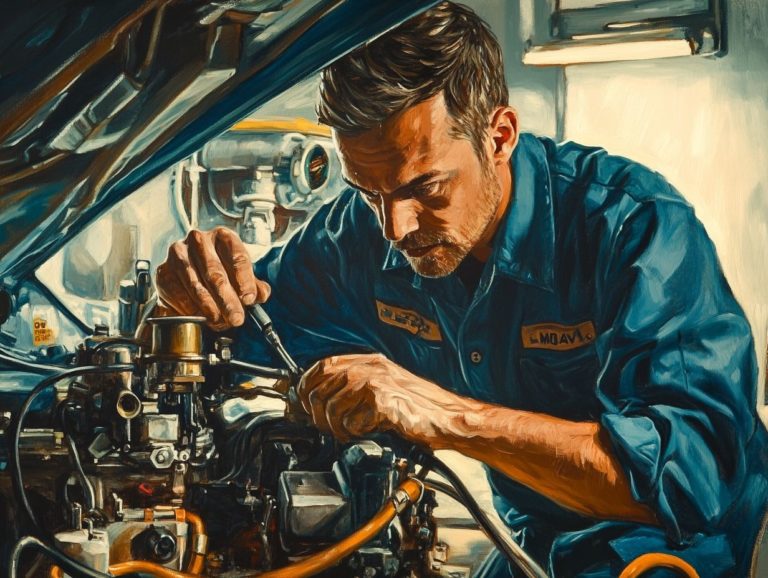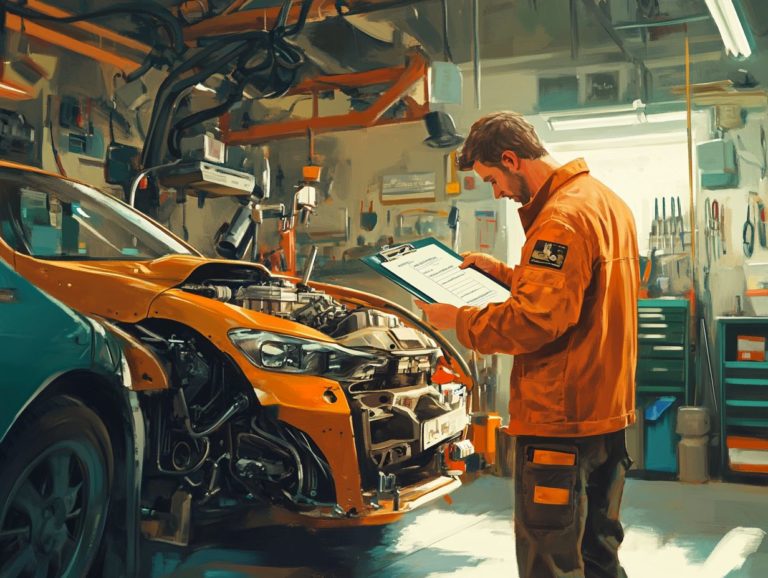Essential Questions to Ask Before Car Inspection
Car inspections play a vital role in vehicle maintenance, ensuring your safety and reliability on the road.
Whether you re a seasoned car owner or stepping into the driver s seat for the first time, grasping the ins and outs of a car inspection and its significance can save you both time and money in the long run.
This guide will provide you with everything you need to know from the various types of inspections and their associated costs to how to prepare for one and key factors to watch out for.
Arm yourself with essential knowledge that will help keep your car in peak condition!
Contents
- Key Takeaways:
- 1. What Is a Car Inspection?
- 2. Why Is a Car Inspection Important?
- 3. What Are the Different Types of Car Inspections?
- 4. How Often Should a Car Be Inspected?
- 5. What Are the Key Components Checked During a Car Inspection?
- 6. How Much Does a Car Inspection Cost?
- 7. What Should I Look for in a Car Inspection Service Provider?
- 8. What Are the Red Flags to Watch Out for During a Car Inspection?
- 9. What Are the Consequences of Skipping a Car Inspection?
- 10. How Can I Prepare for a Car Inspection?
- 11. What Are the Most Common Issues Found During a Car Inspection?
- 12. How Can I Negotiate Repairs After a Failed Car Inspection?
- 13. Can I Do My Own Car Inspection?
- 14. How Can I Maintain My Car to Pass Inspections?
- 15. What Are the Different Laws and Regulations Surrounding Car Inspections?
- Frequently Asked Questions
- What is a car inspection and why is it important?
- What should I do to prepare for a car inspection?
- What types of questions should I ask before a car inspection?
- Should I go to a dealership or an independent mechanic for a car inspection?
- Will a car inspection guarantee that my car is problem-free?
- How often should I get a car inspection?
Key Takeaways:

Regular car inspections are essential for ensuring the safety and functionality of your vehicle.
Choosing a reputable and reliable car inspection service provider is crucial for a thorough and accurate inspection, as car buyers need to know about inspections to make informed decisions.
Don t wait until it s too late skipping or neglecting car inspections can lead to costly repairs and potential legal consequences.
1. What Is a Car Inspection?
Getting your car inspected is a smart move for your safety! A car inspection is a careful check-up designed to assess your vehicle’s condition, safety standards, and overall functionality.
This ensures it meets the necessary regulations and can perform reliably on the road.
This process often includes a thorough review of the vehicle’s history along with a detailed assessment, typically carried out by a qualified mobile technician or at an authorized auto shop like Wrench or Lemon Squad, all while utilizing an inspection checklist for precision.
During this process, key components are scrutinized, from the brakes and tires to the engine and transmission. Each item on the checklist serves as a roadmap, helping technicians systematically identify any potential issues that could impact safety or performance.
Standardized criteria ensure a consistent experience across different inspections. The insights gathered from your vehicle’s history such as past accidents or maintenance records can significantly influence the inspection outcome, prompting a deeper analysis and informing potential buyers about the vehicle’s reliability and future performance.
2. Why Is a Car Inspection Important?
A car inspection is an essential step in ensuring your vehicle’s safety and reliability. Knowing what to look for in a car inspection helps you identify mechanical problems before they escalate into serious issues, ultimately enhancing your vehicle’s longevity and resale value.
Neglecting this vital procedure can create dangerous driving conditions. A malfunctioning brake system or worn-out tires may drastically compromise performance and safety.
Preventive maintenance is crucial; regular inspections can catch minor issues early, sparing you the headache of costly repairs down the line.
By maintaining your vehicle through inspections, you not only keep it performing at its best but also significantly influence its resale value. A well-documented history of inspections can attract potential buyers, demonstrating that the car has been well cared for, making it a wise investment in the long run.
3. What Are the Different Types of Car Inspections?
Different types of car inspections serve various purposes. For example, dealership inspections align with safety recalls, while comprehensive evaluations by independent mechanics focus on vehicle warranties and potential defects.
Each inspection type addresses distinct needs, ensuring that your vehicle remains in optimal condition and safe for the road.
A pre-purchase inspection assesses a vehicle’s overall health before you make that commitment, while routine maintenance checks help you adhere to manufacturer guidelines, effectively prolonging your vehicle’s lifespan.
Specialized inspections, such as emissions testing or collision assessments, are crucial for meeting safety standards and regulations. Mechanics and auto shops play an integral role in conducting these inspections, offering valuable insights that empower you to make informed decisions about maintenance and repairs, ultimately enhancing both safety and reliability.
4. How Often Should a Car Be Inspected?
The frequency of car inspections varies based on factors like vehicle ownership, usage patterns, and the manufacturer’s maintenance plan. It’s wise to have your vehicle inspected at least once a year, ideally during your routine preventive maintenance.
Mileage is also a key consideration. If you’re frequently on the road, your vehicle may need more regular check-ups to address wear and tear. The age of your car matters too; older vehicles often require closer inspections to ensure all components function securely.
State regulations can dictate specific inspection requirements, which differ significantly by region. Following a structured maintenance plan not only prolongs your vehicle’s lifespan but also simplifies tracking service records, proving invaluable for future reference and enhancing resale value.
5. What Are the Key Components Checked During a Car Inspection?
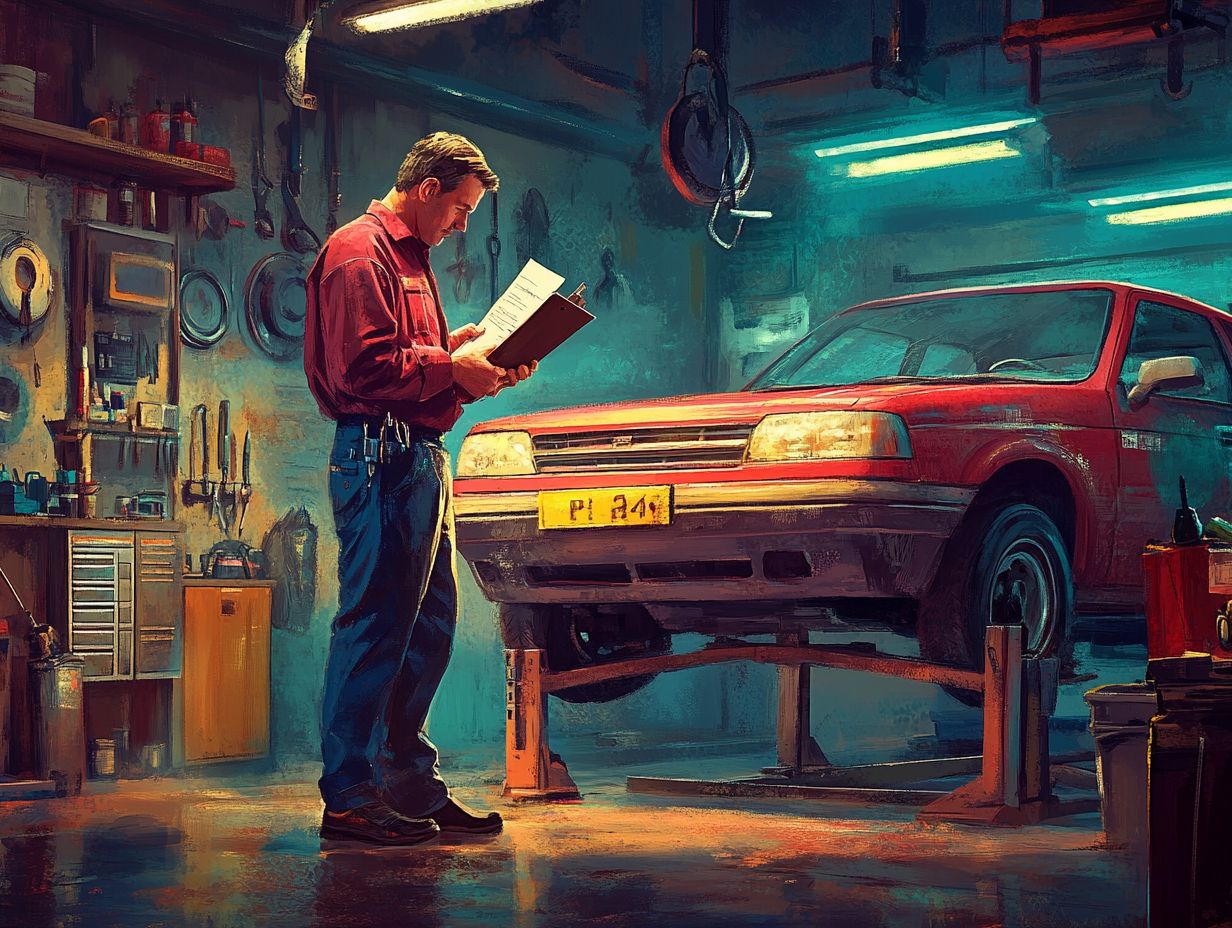
During a car inspection, expect a meticulous evaluation of several key components, including:
- The brake system
- Tire condition
- Adherence to emission standards (which ensure your vehicle meets environmental regulations)
Fluid levels like engine oil, coolant, and brake fluid are checked to ensure your vehicle operates smoothly. Safety features such as airbags and seatbelts are scrutinized to protect you in an accident.
The vehicle’s overall records, including past repairs and maintenance history, provide valuable insights into its reliability. Each of these components is essential for optimal performance and the safety of both the driver and passengers, significantly reducing the risk of breakdowns and accidents.
6. How Much Does a Car Inspection Cost?
The cost of a car inspection varies based on the services you require. Dealerships often charge more due to their policies, while inspections from independent mechanics typically fall within the $100 to $200 range.
Several factors contribute to these pricing differences. Your location plays a role; urban areas may see higher rates due to increased demand and operational costs. The choice of service provider is also crucial. Dealerships might offer comprehensive inspections with brand-specific expertise, while independent mechanics often provide a straightforward and cost-effective solution.
Additionally, specific services, such as emissions testing or advanced diagnostics, can influence the total cost. Compare quotes and understand each service’s offerings to make informed decisions that align with your vehicle’s needs and your budget.
7. What Should I Look for in a Car Inspection Service Provider?
When choosing a car inspection service provider, weigh factors like customer service reputation, experience, and understanding of vehicle warranties alongside the specific inspection services offered.
Certifications are critical in assessing the credibility of the inspection service. Reputable providers typically showcase their commitment to high industry standards. Online reviews offer valuable insights into the experiences of past customers.
Clear communication builds trust and ensures transparency. Opting for a qualified independent mechanic can elevate the quality of the inspection. Their expertise often results in a thorough and unbiased evaluation of your vehicle’s condition.
Have your car inspected now to ensure safety on the road!
8. What Are the Red Flags to Watch Out for During a Car Inspection?
During a car inspection, you may encounter several red flags that suggest potential mechanical problems. To better prepare yourself, it’s helpful to know what to expect during a used car inspection. Unusual noises, warning lights, and discrepancies in the inspection report can indicate serious safety concerns.
Inspectors pay close attention to fluid leaks from the engine, transmission, or braking system, as these can signal significant issues that may compromise your safety. They also check tire tread depth and wear patterns for signs of uneven wear, which could hint at alignment or suspension problems.
A thorough inspection report is essential. It provides a structured format to document findings and highlight concerns. Accurate records empower both inspectors and vehicle owners to understand maintenance needs and past repairs, ensuring transparency and prompting timely action.
9. What Are the Consequences of Skipping a Car Inspection?
Skipping a car inspection can lead to serious consequences, such as an increased risk of mechanical problems, compromised safety, and higher repair costs from missed preventive maintenance.
When you overlook this vital aspect of vehicle care, you endanger your safety and put others on the road at risk. The National Highway Traffic Safety Administration (NHTSA) reports that nearly 30,000 crashes each year are linked to vehicle issues that routine inspections could have caught.
Ignoring minor problems can snowball into major headaches, resulting in unexpected breakdowns and hefty repair bills. Vehicles that receive regular inspections generally enjoy longer lifespans, fewer roadside emergencies, and lower overall ownership costs.
Don’t risk it! Schedule your inspection today to avoid costly repairs.
10. How Can I Prepare for a Car Inspection?
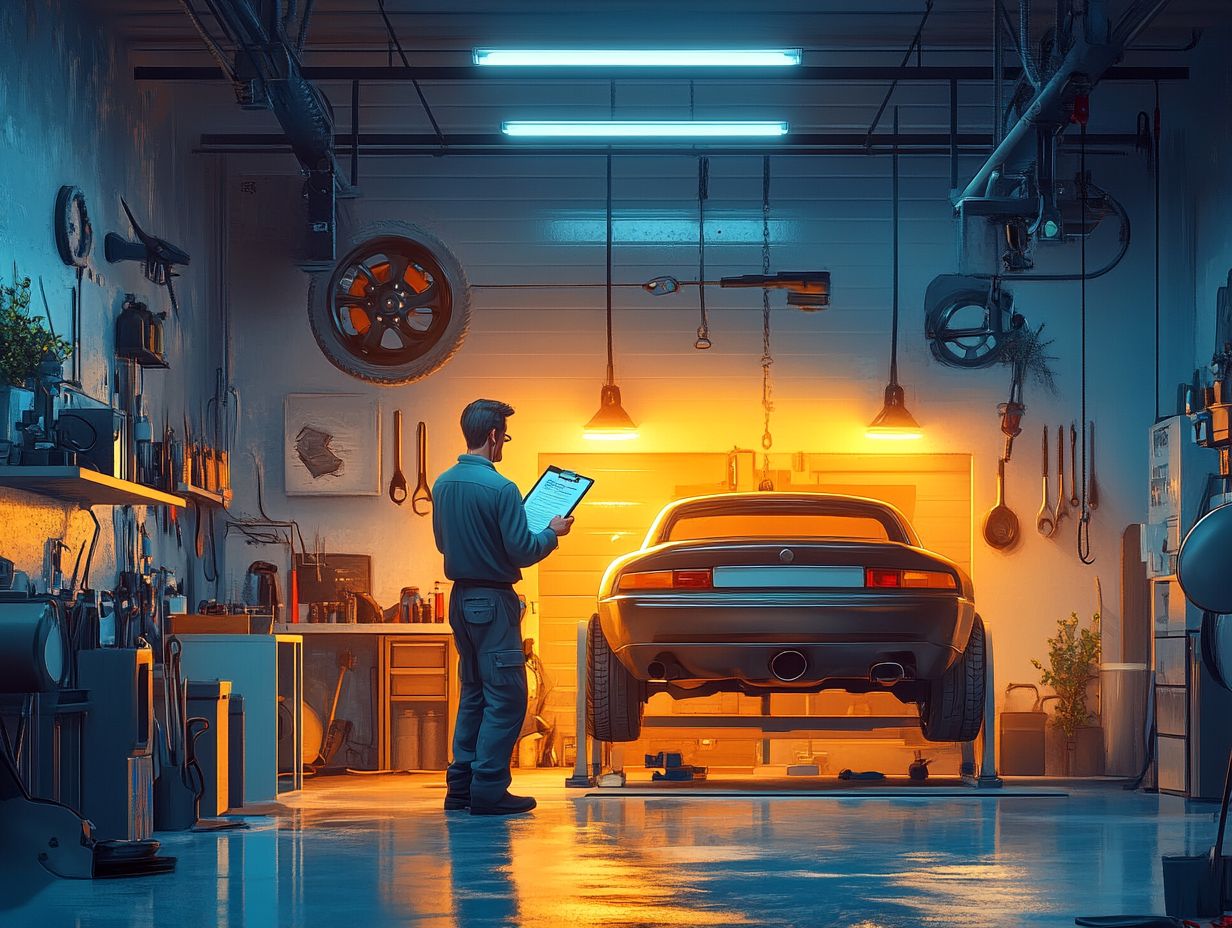
Preparing for a car inspection means gathering essential documents like vehicle history, maintenance plans, and service records. To ensure a successful process, learn how to conduct a thorough car inspection and make sure your vehicle meets the standards outlined in the checklist.
Organizing these materials streamlines the process and shows your commitment to keeping your vehicle in good shape. Create a dedicated folder for:
- Insurance documentation
- Registration papers
- Any warranties
- Any previous inspection reports
Before the big day, thoroughly check the tires, brakes, and lights to avoid last-minute surprises. By addressing minor issues in advance, you’ll feel confident that your vehicle is roadworthy and ready for an objective assessment.
11. What Are the Most Common Issues Found During a Car Inspection?
During a car inspection, common problems include worn brake pads, poor tire conditions, and various mechanical issues. To ensure you’re making a well-informed decision, it’s important to know what to ask when buying a used car. These concerns are frequently noted in vehicle records, serving as valuable guides for necessary repairs.
These problems can jeopardize your vehicle’s safety, leading to decreased performance and even accidents. Ignoring worn brake pads increases your stopping distances, putting you and your passengers at risk.
Poorly maintained tires can compromise traction and handling, especially in difficult weather. By proactively addressing these issues during inspections, you can avoid costly and extensive repairs later.
Regular check-ups boost your vehicle s performance and extend its lifespan, ensuring that your journeys on the road are as safe as possible.
12. How Can I Negotiate Repairs After a Failed Car Inspection?
Negotiating repairs after a failed car inspection requires a careful approach.
First, review the inspection report in detail. Understand the associated repair costs and formulate informed questions for the mechanic to secure the best deal possible.
Before engaging in discussions with the mechanic, distinguish between repairs essential for safe operation and those that can be postponed. Additionally, it’s wise to know how to inspect a used car before purchase to clarify any technical jargon in the inspection report and grasp what each issue means.
Ask the mechanic about the most urgent repairs first. Request a detailed breakdown of costs for each item. This preparation allows you to prioritize repairs based on urgency and your budget.
Take notes during the conversation. This helps you compare quotes later and improves your negotiation strategy, ensuring you get the best outcome possible.
13. Can I Do My Own Car Inspection?
You can perform a basic car inspection on your own, but it’s wise to use a detailed checklist and consult with an independent mechanic for a comprehensive assessment of your vehicle’s condition. For a better understanding of the car inspection process, this approach helps you identify minor issues before they become significant problems and ensures your safety on the road.
Start by checking essential fluids like oil and coolant, inspecting tire pressure, and testing brake functionality. Using the best practices for a car inspection checklist is critical; it offers a structured method to evaluate your vehicle systematically, helping you avoid overlooking vital components.
If you hear unusual sounds, see warning lights, or find that repairs exceed basic maintenance, contact a professional mechanic. Their expertise can illuminate complex issues that might not be immediately obvious, ensuring your vehicle remains in prime condition.
14. How Can I Maintain My Car to Pass Inspections?
Maintaining your car through regular preventive maintenance, such as timely oil changes and fluid level checks, is essential for ensuring it passes inspections and remains in optimal operating condition.
To achieve peak performance and extend its lifespan, routinely inspect your tires for proper inflation and tread depth (the depth of the grooves in your tires that help with grip), check the brakes for wear, and replace filters as necessary.
Staying on top of scheduled maintenance guarantees a smoother ride and reduces the chances of costly breakdowns.
Keeping your service records up-to-date is crucial. This provides a comprehensive history that can enhance resale value and proves invaluable when addressing warranty claims or during inspections.
Taking care of your vehicle shows you’re a responsible driver who values both safety and quality.
15. What Are the Different Laws and Regulations Surrounding Car Inspections?
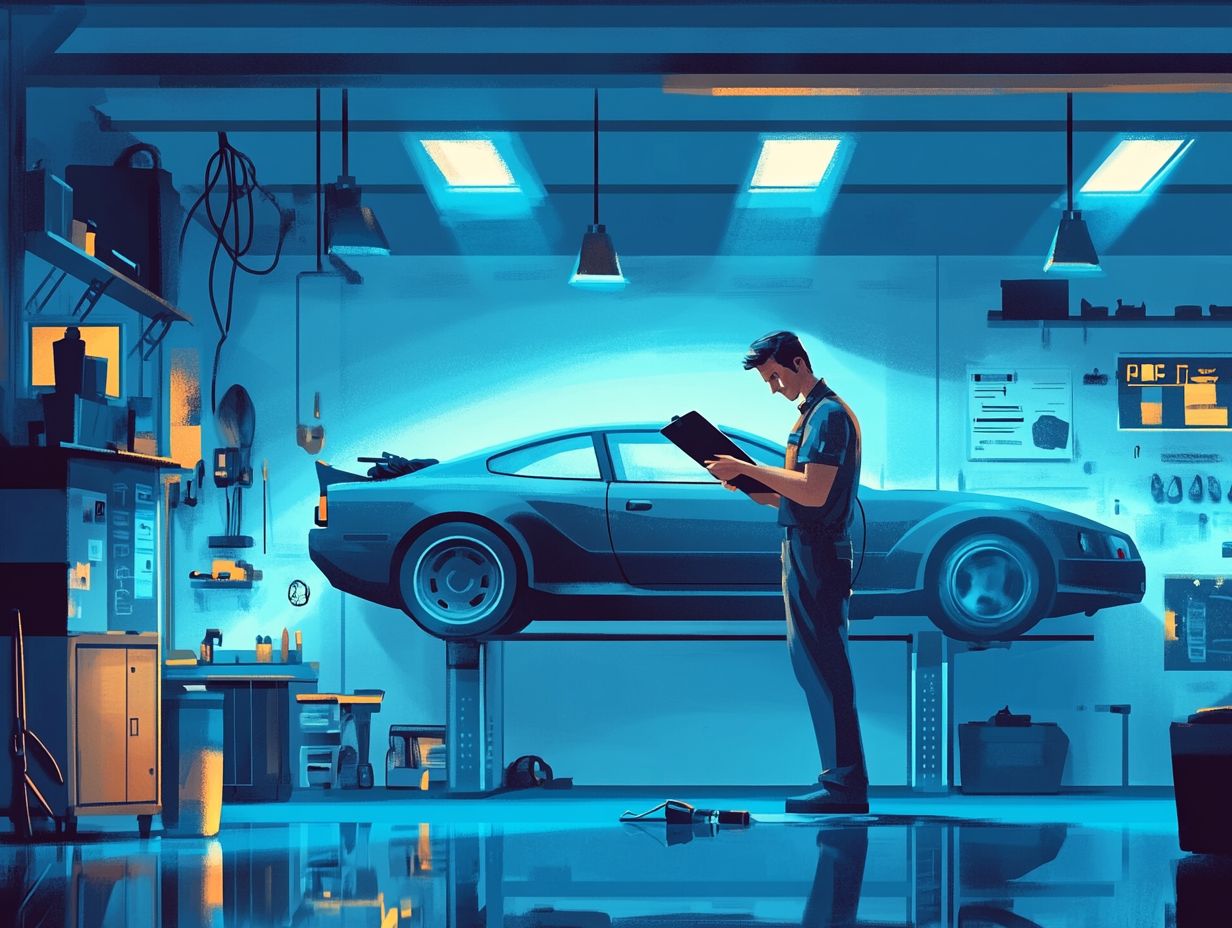
Car inspections are shaped by a complex web of laws and regulations that dictate safety and emission standards, with significant variations from state to state. This patchwork of rules can influence dealership policies and even the conditions of vehicle warranties.
These regulations are essential for maintaining public safety. They ensure that the vehicles you encounter on the road meet specific criteria, reducing the chances of accidents caused by mechanical failures. State-specific laws often include measures aimed at minimizing environmental impact, such as emission testing designed to curb pollutants from vehicles.
For example, California has stringent standards, while other states might adopt more lenient approaches. Ultimately, these frameworks encourage responsible vehicle maintenance and cultivate a culture of accountability among both drivers and manufacturers.
Frequently Asked Questions
What is a car inspection and why is it important?
A car inspection is a detailed check of your vehicle. It examines safety, emissions, and any potential mechanical issues. It’s important because it ensures your car is safe to drive and meets all necessary regulations.
What should I do to prepare for a car inspection?
Clean your car inside and out. Check your fluids and tire pressure, and fix any known issues.
Gather necessary paperwork like registration and insurance documents.
What types of questions should I ask before a car inspection?
Ask these important questions: What items will be checked during the inspection? Will I get a detailed report? What will it cost? How long will the inspection take? To prepare effectively, consider learning how to make the most of your car inspection.
Should I go to a dealership or an independent mechanic for a car inspection?
This choice depends on what you prefer. Dealerships know more about specific car models, while independent mechanics often offer better prices.
Will a car inspection guarantee that my car is problem-free?
No, an inspection doesn t guarantee your car is free of problems. It can find current issues but can t predict future ones.
Regular maintenance is essential. Always watch for warning signs!
How often should I get a car inspection?
The frequency of inspections varies by state. Generally, aim for one inspection annually or every 12,000 miles.
If you notice any changes with your car, get it inspected right away!

